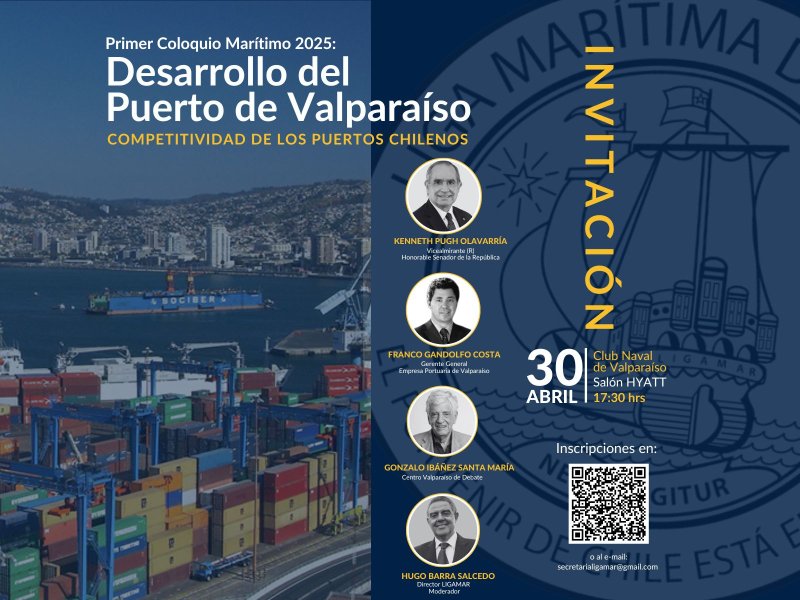
El pasado martes 29 de octubre, la Liga Marítima de Chile celebró su 6° Coloquio en el Salón Prat, abordando la transformación digital en la logística marítima. La exposición principal estuvo a cargo de Matthew Taylor Pollmann, ingeniero industrial, socio de la Liga Marítima de Chile y director de Empresas Taylor, quien compartió su experiencia y perspectivas sobre los desafíos y oportunidades que la digitalización trae a esta industria clave.
Taylor Pollmann destacó la importancia de esta transición tecnológica en el sector, señalando que "la transformación digital no es solo una opción, sino una necesidad urgente para la industria marítima, que busca mejorar la eficiencia y competitividad en el contexto global".
En su presentación, enfatizó cómo el avance en tecnologías digitales puede resolver problemas estructurales en la logística, mejorar la trazabilidad de los envíos y permitir una optimización de recursos en tiempo real.
 Durante el coloquio, Matthew Taylor explicó que el desarrollo de plataformas digitales es crucial para integrar y agilizar los procesos de la cadena logística marítima, facilitando la interacción y el intercambio de datos entre actores clave. “La digitalización facilita un intercambio de información más fluido y preciso, pero también requiere que los diferentes actores del sector lleguen a consensos sobre estándares y procedimientos compartidos”, afirmó.
Durante el coloquio, Matthew Taylor explicó que el desarrollo de plataformas digitales es crucial para integrar y agilizar los procesos de la cadena logística marítima, facilitando la interacción y el intercambio de datos entre actores clave. “La digitalización facilita un intercambio de información más fluido y preciso, pero también requiere que los diferentes actores del sector lleguen a consensos sobre estándares y procedimientos compartidos”, afirmó.
En comparación con otras industrias, como la aviación, el experto señaló que la logística marítima tiene mucho camino por recorrer, dado que en este sector aún existen numerosos procesos manuales que reducen la competitividad. “La automatización y el uso de tecnologías avanzadas, como el blockchain y los gemelos digitales, son esenciales para hacer que la industria marítima sea más atractiva para los jóvenes profesionales, que buscan entornos de trabajo tecnológicamente avanzados y dinámicos”, comentó Taylor Pollmann.
Desafíos Críticos
Durante el coloquio, se plantearon algunos desafíos críticos que enfrenta la industria en su transformación digital, entre ellos la necesidad de establecer estándares y procedimientos comunes. El experto destacó que “los obstáculos son múltiples, pero es fundamental contar con un estándar, llegar a un acuerdo sobre cómo se hacen las cosas y acordar los pasos del proceso". La falta de un consenso puede dificultar el avance, por lo que lograr una estandarización y un lenguaje común entre los actores del sector es crucial para una implementación efectiva.
Resistencia humana al cambio
Otro de los temas abordados fue la resistencia humana al cambio, aspecto clave en el proceso de transformación. Matthew Taylor advirtió que la digitalización y automatización implican cambios en los puestos de trabajo, ya que ciertas tareas manuales pueden quedar obsoletas. “La industria debe asumir el desafío de capacitar a las personas en competencias digitales y trabajar en conjunto con las autoridades para implementar programas de reskilling que preparen a los empleados para los nuevos roles que demanda la digitalización”, comentó.
Inteligencia Artificial
En cuanto a la inteligencia artificial, Taylor Pollmann explicó que esta tecnología ya está transformando varias áreas de la logística marítima, desde el servicio al cliente hasta el reconocimiento de patrones en porterías y la capacidad de clasificar datos en tiempo real. “La inteligencia artificial optimiza la eficiencia y elimina ciertas limitaciones humanas”, afirmó.
El experto también resaltó los desafíos éticos de la digitalización, como definir qué información es compartible y cómo protegerla. “Definir los límites éticos en el uso de datos y asegurar que todos comprendamos los mismos estándares es una tarea esencial en esta transformación”, explicó.
Mesas Público-Privadas
Finalmente, el rol del Estado también fue objeto de reflexión. Taylor Pollmann reconoció que el gobierno ha hecho avances importantes en otras industrias, como la bancaria, pero señaló que sería positivo contar con mesas de articulación público-privadas más enfocadas en la experiencia del cliente y en una visión integral del desarrollo logístico. “Se necesita una visión país que incluya infraestructura portuaria, ferroviaria y vial, para garantizar una mayor eficiencia en el transporte y la logística”, señaló.
Empresas Taylor, Gemelo Digital
Durante el Coloquio, Taylor Pollmann explicó cómo Empresas Taylor está abordando esta transformación a través de herramientas digitales como el gemelo digital, Smart Flux, que ha permitido reducir tiempos y optimizar el flujo de carga en la cadena de suministro. “En diciembre lanzaremos esta solución y planeamos expandirla a otros mercados de América Latina”, anunció, subrayando la importancia de llevar esta transformación a toda la región.
Edmundo González Robles: "La digitalización es clave para la eficiencia, sostenibilidad y competitividad del sector marítimo"
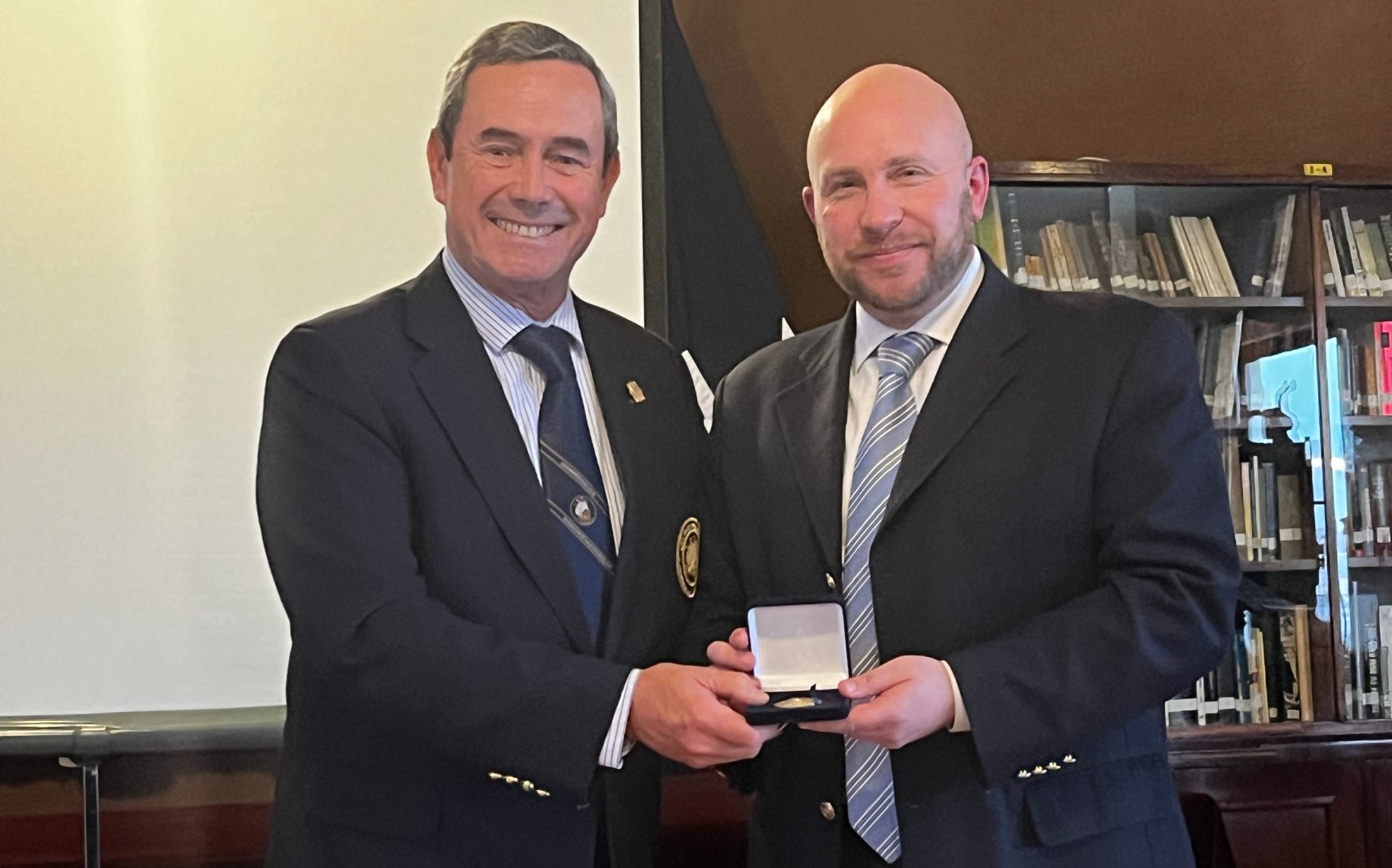 Durante la apertura del 6° Coloquio, el presidente de Liga Marítima de Chile, Edmundo González Robles, destacó el impacto de estas instancias en la agenda marítima del país, subrayando su papel como espacios fundamentales para debatir los avances y desafíos del sector. "Estos coloquios son esenciales para la agenda marítima de Chile, permitiendo que la industria aborde temas críticos y avance hacia una visión compartida de desarrollo y sostenibilidad", afirmó.
Durante la apertura del 6° Coloquio, el presidente de Liga Marítima de Chile, Edmundo González Robles, destacó el impacto de estas instancias en la agenda marítima del país, subrayando su papel como espacios fundamentales para debatir los avances y desafíos del sector. "Estos coloquios son esenciales para la agenda marítima de Chile, permitiendo que la industria aborde temas críticos y avance hacia una visión compartida de desarrollo y sostenibilidad", afirmó.
González Robles hizo hincapié en la importancia de adoptar tecnologías avanzadas para optimizar las operaciones en el ámbito marítimo. “Nuestro propósito es explorar cómo la tecnología puede mejorar la eficiencia, la sostenibilidad y la competitividad de esta gran industria”, señaló.
Además, enfatizó que la digitalización, con herramientas como la inteligencia artificial, representa una solución para desafíos operativos y de transparencia en toda la cadena logística. “La digitalización busca adaptarse a las exigencias de un entorno global cada día más complejo y demandante”, añadió.
Francisco Díaz: “Chile está partiendo en la digitalización del transporte marítimo, pero va por buen camino”

El Capitán de Fragata y Máster en Logística, Francisco Díaz, participante del 6° Coloquio, expresó su entusiasmo por el tema central de la conferencia, señalando: “Bastante bien el tema del transporte marítimo, sobre todo lo relacionado a los contenedores y cómo está fluyendo el mercado en el tema de la digitalización”.
Consultado sobre el estado en que está Chile en esta materia, Díaz comentó que el país está aún en las etapas iniciales, con desafíos en áreas como la legislación, capacitación de personal y la implementación de software y hardware. "Yo creo que estamos en una etapa inicial, queda mucho camino aún por recorrer porque se trata de algo que es complejo, pero vamos por buen camino”, afirmó.
Además, Díaz valoró la iniciativa de la Liga Marítima de Chile de realizar este tipo de coloquios: “Son bastante buenas porque dan a conocer el ambiente marítimo a la sociedad, y creo que es una muy buena experiencia participar en este tipo de actividades”.
Claudio Morales: "La transformación digital en el sector marítimo-portuario es fundamental para el comercio exterior"
 El director de la Liga Marítima de Chile, Claudio Morales, calificó el 6° Coloquio como una instancia clave para el sector: "Los coloquios de la Liga Marítima siempre son muy interesantes; siempre hay temas que interesan al rubro marítimo-portuario. El de hoy específicamente es gravitante porque toda la tecnología que viene en camino y que estamos esperando, como la digitalización en la industria marítima, es fundamental para todo el comercio".
El director de la Liga Marítima de Chile, Claudio Morales, calificó el 6° Coloquio como una instancia clave para el sector: "Los coloquios de la Liga Marítima siempre son muy interesantes; siempre hay temas que interesan al rubro marítimo-portuario. El de hoy específicamente es gravitante porque toda la tecnología que viene en camino y que estamos esperando, como la digitalización en la industria marítima, es fundamental para todo el comercio".
Morales, quien también es vicepresidente ejecutivo de la Asociación de Agentes de Naves de Chile ASONAVE A.G., destacó el impacto directo que la digitalización tiene en el sector: “Es un tema que nos impacta bastante. La tecnología y la transformación digital son esenciales para reducir costos y minimizar los tiempos, dos factores que inciden directamente en los costos del negocio del comercio exterior”.
Sobre el estado de Chile en este proceso, Morales señaló que el país ha avanzado, aunque no tan rápidamente como otras naciones. "Yo creo que Chile ha avanzado en digitalización; no sé si tan rápido como el resto del mundo, pero creo que estamos al día, estamos a la par. Las empresas, al menos nuestras asociadas, todas están implementando sus sistemas digitales".
Morales, quien ha sido testigo de los primeros esfuerzos de digitalización hace más de 30 años, reconoció el progreso alcanzado hasta hoy. "Lo que presentó hoy don Matthew Taylor fue muy interesante porque creo que para allá va todo el camino y la solución para bajar costos y mejorar la eficiencia".
Valparaíso, 30 de octubre del 2024
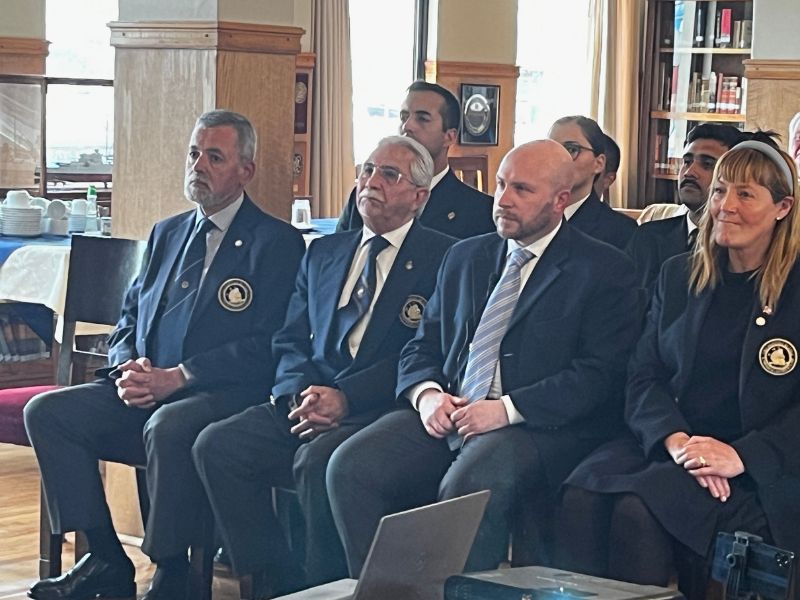
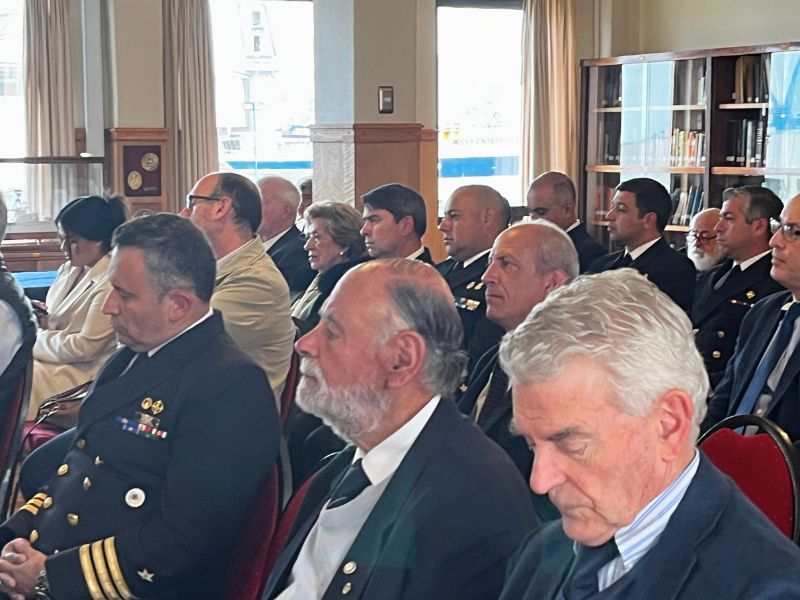
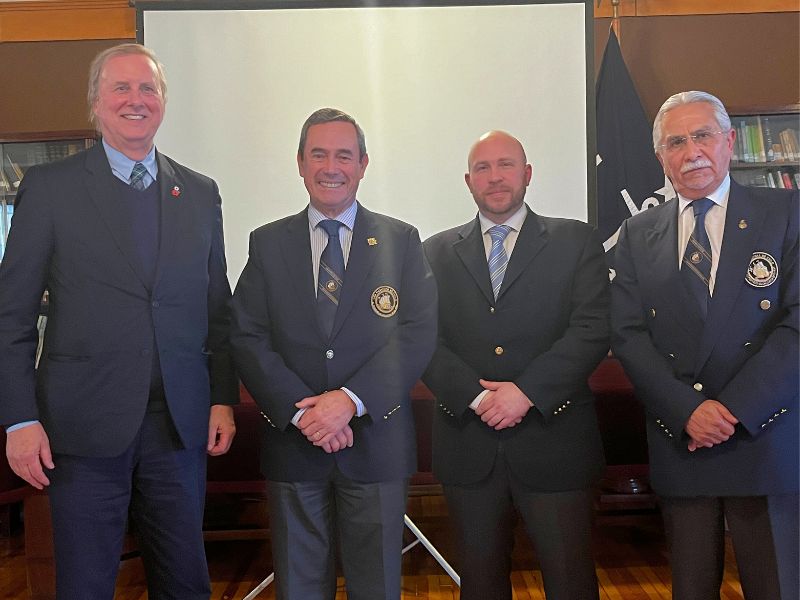
_________________________________________________________________________________________
‘Digital Revolution or Stagnation’: Liga Marítima addresses the future of Logistics in Chile
During the Colloquium, the urgency to advance in digitalisation and standardisation was highlighted, noting that tools such as artificial intelligence and blockchain are essential to enhance the sector's competitiveness.
On Tuesday, 29 October, the Liga Marítima de Chile held its 6th Colloquium in the Prat Hall, focusing on digital transformation in maritime logistics. The keynote speech was delivered by Matthew Taylor Pollmann, an industrial engineer, member of the Liga Marítima de Chile, and director of Empresas Taylor, who shared his experience and perspectives on the challenges and opportunities that digitalisation brings to this key industry.
Taylor Pollmann emphasised the importance of this technological transition in the sector, stating that "digital transformation is not just an option, but an urgent necessity for the maritime industry, which seeks to improve efficiency and competitiveness in a global context."
In his presentation, he stressed how advancements in digital technologies can solve structural problems in logistics, improve shipment traceability, and enable real-time resource optimisation.
During the colloquium, Matthew Taylor explained that the development of digital platforms is crucial to integrate and streamline processes within the maritime logistics chain, facilitating interaction and data exchange among key players. “Digitalisation allows for a more fluid and precise exchange of information, but it also requires that different players in the sector reach consensus on shared standards and procedures,” he stated.
Compared to other industries, such as aviation, the expert pointed out that maritime logistics has a long way to go, as this sector still has numerous manual processes that reduce competitiveness. “Automation and the use of advanced technologies, like blockchain and digital twins, are essential to make the maritime industry more attractive to young professionals, who seek technologically advanced and dynamic work environments,” Taylor Pollmann commented.
Critical Challenges
During the colloquium, several critical challenges faced by the industry in its digital transformation were raised, including the need to establish common standards and procedures. The expert noted that “the obstacles are multiple, but it’s essential to have a standard, reach an agreement on how things are done, and agree on the process steps." The lack of consensus can hinder progress, so achieving standardisation and a common language among sector players is crucial for effective implementation.
Human Resistance to Change
Another topic discussed was human resistance to change, a key aspect of the transformation process. Matthew Taylor warned that digitalisation and automation imply changes in jobs, as certain manual tasks may become obsolete. “The industry must take on the challenge of training people in digital skills and work jointly with authorities to implement reskilling programmes that prepare employees for the new roles demanded by digitalisation,” he remarked.
Artificial Intelligence
Regarding artificial intelligence, Taylor Pollmann explained that this technology is already transforming several areas of maritime logistics, from customer service to pattern recognition at gates and the ability to classify data in real-time. “Artificial intelligence optimises efficiency and removes certain human limitations,” he stated.
The expert also highlighted the ethical challenges of digitalisation, such as defining which information can be shared and how to protect it. “Defining ethical boundaries in data use and ensuring everyone understands the same standards is an essential task in this transformation,” he explained.
Public-Private Tables
Finally, the role of the State was also reflected upon. Taylor Pollmann acknowledged that significant advances have been made in other industries, such as banking, but noted that it would be beneficial to have more public-private articulation tables focused on customer experience and an integrated vision of logistical development. “A national vision is needed that includes port, rail, and road infrastructure to ensure greater efficiency in transport and logistics,” he noted.
Empresas Taylor, Digital Twin
During the Colloquium, Taylor Pollmann explained how Empresas Taylor is tackling this transformation through digital tools like the digital twin, Smart Flux, which has reduced times and optimised cargo flow in the supply chain. “In December, we’ll be launching this solution and planning to expand it to other Latin American markets,” he announced, stressing the importance of extending this transformation across the region.
Edmundo González Robles: "Digitalisation is key for the efficiency, sustainability, and competitiveness of the maritime sector"
During the opening of the 6th Colloquium, the president of the Liga Marítima de Chile, Edmundo González Robles, highlighted the impact of these events on the country’s maritime agenda, underscoring their role as fundamental spaces for discussing the sector's advancements and challenges. "These colloquiums are essential for Chile’s maritime agenda, allowing the industry to address critical issues and move towards a shared vision of development and sustainability," he stated.
González Robles emphasised the importance of adopting advanced technologies to optimise operations in the maritime sector. “Our purpose is to explore how technology can enhance the efficiency, sustainability, and competitiveness of this great industry,” he noted.
He also stressed that digitalisation, with tools like artificial intelligence, represents a solution for operational and transparency challenges throughout the logistics chain. “Digitalisation aims to adapt to the demands of an increasingly complex and demanding global environment,” he added.
Francisco Díaz: "Chile is beginning digitalisation in maritime transport, but is on the right path"
Commander and Master in Logistics Francisco Díaz, a participant in the 6th Colloquium, expressed his enthusiasm for the event's central theme, saying, “The topic of maritime transport is going quite well, especially containers and how the market is flowing in digitalisation.”
When asked about Chile’s status in this area, Díaz commented that the country is still in the initial stages, with challenges in areas like legislation, personnel training, and the implementation of software and hardware. “I think we are in an initial stage; there’s a long way to go because it’s complex, but we’re on the right path,” he affirmed.
Díaz also valued the Maritime League of Chile’s initiative to hold these kinds of colloquiums: “They’re very beneficial because they introduce the maritime environment to society, and I think it’s a great experience to participate in such activities.”
Claudio Morales: "Digital transformation in the maritime-port sector is fundamental for foreign trade"
Director of the Liga Marítima de Chile, Claudio Morales, described the 6th Colloquium as a key instance for the sector: "The Maritime League’s colloquiums are always very interesting; there are always topics that interest the maritime-port sector. Today’s was particularly relevant because all the technology coming and what we are expecting, like digitalisation in the maritime industry, is fundamental for all trade."
Morales, who is also Executive Vice President of the Association of Ship Agents of Chile (ASONAVE A.G.), highlighted the direct impact of digitalisation on the sector: “It’s an issue that affects us significantly. Technology and digital transformation are essential to reduce costs and minimise times, two factors that directly impact the cost of foreign trade business.”
On Chile’s progress in this process, Morales noted that the country has advanced, albeit not as quickly as other nations. “I believe Chile has advanced in digitalisation; I don’t know if as fast as the rest of the world, but I think we’re up to date, we’re keeping pace. Our associated companies are all implementing their digital systems.”
Morales, who has witnessed the initial efforts in digitalisation over 30 years ago, acknowledged the progress achieved to date. “What Mr. Matthew Taylor presented today was very interesting because I believe that’s the way forward, the solution to reduce costs and improve efficiency.”
Valparaíso, October 2024
